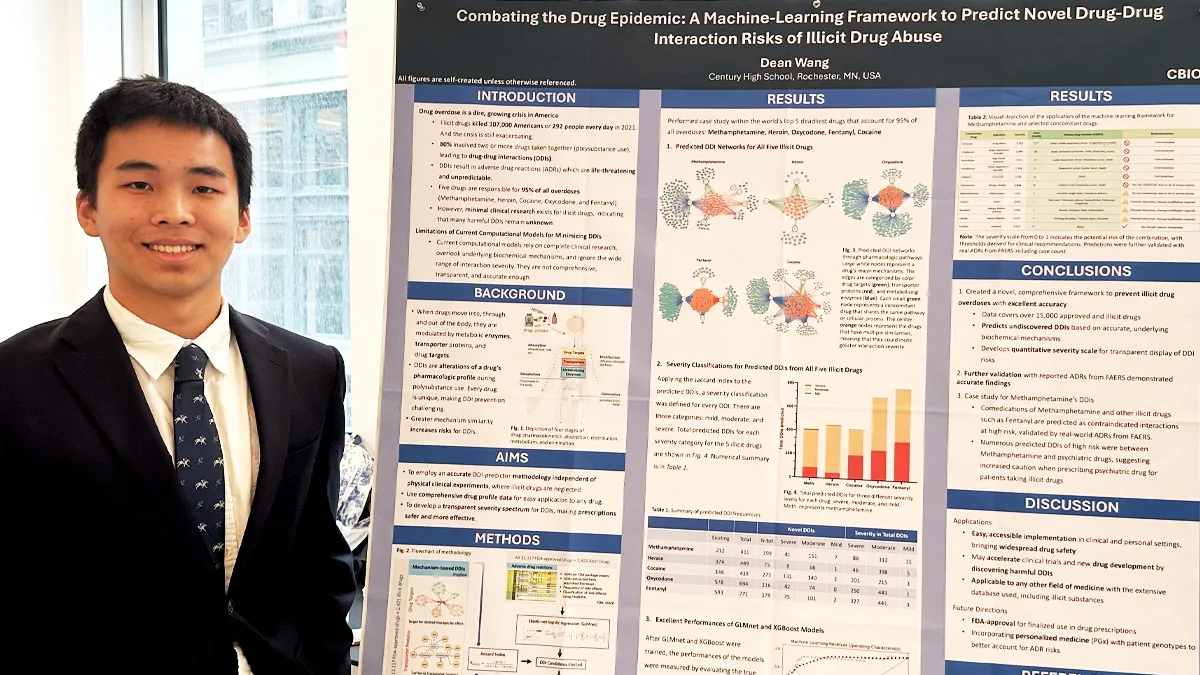
Overview
Using machine learning to take on drug overdoses earned Dean Wang a finalist position in the 2024 BioGENEius Challenge.
How to identifying previously unknown drug-drug interactions?
Using machine learning to take on drug overdoses earned Dean Wang, an eleventh grader Century High School in Rochester, MN, a finalist position in the 2024 BioGENEius Challenge.
Wang developed an algorithm capable of identifying previously unknown drug-drug interactions and their potential severity. His algorithm trained on molecular and metabolic data of more than 15,000 FDA-approved drugs and illicit substances, yielding information that could inform clinical decisions.
The esteemed competition, founded by the Biotechnology Institute more than two decades ago, showcases the finest young talent in biotechnology from across the United States. Cure hosted the 2024 BioGENEius Challenge ceremonies, awarding a $500 prize to Iyer and three other finalists as well as top prize of $2,500 to Yifan Ding.
The students also toured labs at CURE and met with biopharma executives to discuss careers in the field of biotechnology. Since its inception, the BioGENEius Challenge has seen its alumni go on to impactful careers as entrepreneurs, physicians, healthcare leaders, and champions for sustainable health and environmental solutions.
Wang spoke with Cure about what inspired him, challenges he faced and the journey he took for his project, “Combating the Drug Epidemic: A Machine-Learning Framework to Predict Novel Drug-Drug Interaction Risks of Illicit Drug Abuse.”
This interview was edited for length and clarity.
Cure: Tell us about the inspiration behind your project? What problem were you hoping to solve?
Wang: The current drug epidemic has huge devastation across the world—and it’s only worsening. My project strives to limit the number of overdoses and create a healthier society.
Cure: What was the biggest challenge you faced while working on your project, and how did you overcome it?
Wang: Finding the data sources was extremely difficult because no one single source has all the necessary data. I compiled multiple sources to best support my project.
Cure: What was the most surprising or unexpected result you encountered during your research?
Wang: When I compared my findings to the FDA’s repository, I found that my predictions were accurate. This was surprising because it verified my findings in the real world.
Cure: How do you see the findings from your project being applied in the real world or in future scientific research?
Wang: In the future, I envision my project being used by physicians and the public alike. Both can use this tool to streamline complex polypharmacy prescriptions.
Cure: What role did mentorship or collaboration play in the success of your project?
Wang: My mentor helped me overcome roadblocks in the coding process by guiding me towards the right steps. He also helped me brainstorm methodology ideas.
Cure: How has this experience influenced your academic or career goals? Do you have specific fields or industries in mind?
Wang: This experience has bolstered my passion for computational biology. In the future, I envision myself as a physician-scientist both innovating biomedical solutions and applying them to the world.
Cure: What advice would you give to other students interested in participating in the BioGENEius Challenge?
Wang: Enjoy the process! Most importantly, the scientific process is what’s most valuable. You’ll learn so much and have tons of fun. Also, you could have an amazing BioGENEius opportunity.
How Wang describes his project:
Over 100,000 overdose deaths occur annually in the US, and 80 percent result from multiple drug use toxicity, yielding unpredictable and fatal drug-drug interactions (DOis).
To mitigate the frightening drug epidemic, my project strives to predict DOis in the world's deadliest illicit substances using a machine-learning algorithm, closely aligning with the healthcare track. The algorithm derives severity classifications and prescription recommendations for harmful DOis, which can cause fatal adverse drug reactions (ADRs) in users concomitantly using illicit substances and other drugs.
The framework, trained on molecular data encompassing 13,117 FDA-approved drugs and 2,421 illicit substances, incorporates drug targets, transporter proteins, and metabolizing enzymes. This approach resonates with the track's values of utilizing basic and translational systems knowledge for human health.
This algorithm identifies undiscovered DOis and derives severity metrics, contributing to drug toxicity reduction and severe complication prevention. With this framework, healthcare providers can make informed decisions when selecting medications, particularly for individuals using a traditionally illicit substance in a medical setting, such as methamphetamine for ADHD. This supports safer treatment options and can improve pharmacovigilance for users previously unaware.
Overall, my project aligns with the [BioGENEius] Global Healthcare Challenge category track by applying translational systems knowledge, advanced data analytics, and computational modeling to address a critical issue in healthcare: DOis in overlooked illicit substances.
Follow the BioGENEius Challenge on LinkedIn and our website: Technology Organization Serving in the US | Bio Technology Institute.








